The Black Dahlia
 for strong violence, some grisly images, sexual content and language.
for strong violence, some grisly images, sexual content and language.
Reviewed by: Michael Karounos
CONTRIBUTOR
| Moral Rating: | Extremely Offensive |
| Moviemaking Quality: |
|
| Primary Audience: | Adults |
| Genre: | Crime Suspense Mystery |
| Length: | 2 hr. 1 min. |
| Year of Release: | 2006 |
| USA Release: |
September 15, 2006 (wide) |
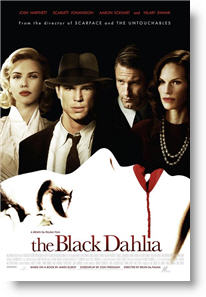

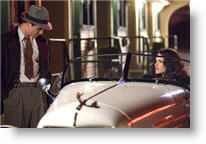
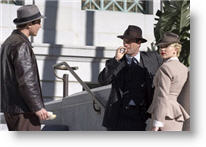
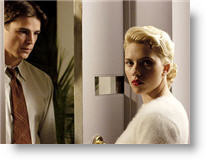
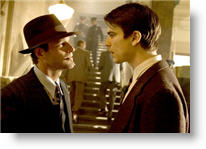
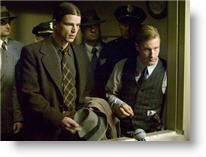
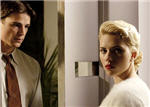
How can I deal with temptations? Answer
Should I save sex for marriage? Answer
How far is too far? What are the guidelines for dating relationships? Answer
What are the consequences of sexual immorality? Answer
How does viewing violence in movies affect the family? Answer
Every time you buy a movie ticket or rent a video you are casting a vote telling Hollywood “That’s what I want.” Why does Hollywood continue to promote immoral programming? Are YOU part of the problem?
| Featuring |
|---|
| Josh Hartnett, Scarlett Johansson, Hilary Swank, Aaron Eckhart, Rose McGowan, Mia Kirshner, Gregg Henry, Mike Starr |
| Director |
|
Brian De Palma |
| Producer |
| Art Linson, Rudy Cohen, Moshe Diamant, Avi Lerner |
| Distributor |
“Inspired by the most notorious unsolved murder in California history”
Based on the best-selling crime novel by James Ellroy.
“The Black Dahlia” is a film noir mystery based on the brutal (and still unsolved) 1947 murder of Elizabeth Short, a 22-year-old aspiring actress. Set in Los Angeles, the film is a narrative mess. Its greatest flaw is that de Palma is so enamored with the sub-plots and ideas which inspired the movie that he forgets to tell a coherent story. He gets lost in the alternately Romantic and Gothic settings of his dramatic vision and shoots the movie as if it were a horror story and not a mystery.
A romantic triangle between Leland Blanchard (Eckhart), Kay Lake (Johansson), and Dwight Bleichert (Hartnett) creates the movie’s dramatic tension as we watch Blanchard (nicknamed “Mr. Fire”) get into trouble by being too passionate, and Bleichert (nicknamed “Mr. Ice”) lose Kay’s respect by not being passionate enough. In the end, Blanchard’s inability to be cool, gets him into fatal difficulty, while Bleichert learns from his past coolness and becomes passionately hot with Kay in a love scene that caused some viewers to laugh out loud.
The interaction between these characters is a good sub-plot to the main story of the murdered young woman. De Palma’s mistake is adding a fourth love interest in the person of the lesbian, Madeline Linscott (Swank), and subplots involving characters named Fitch and DeWitt who distract the viewer’s attention without adding interest to the primary plot. The presence of so many storylines requires numerous digressions that the movie would have been better without.
De Palma skirts around the gruesome mutilation of Elizabeth Short until the end and then, inexplicably, imposes it on the viewer at an inappropriate moment. It is clear that de Palma is making an identification between Elizabeth Short and Kay Lake, but the manner in which he does it is both ineffective and repulsive. When the murderer is revealed, de Palma finally makes explicit the movie’s underlying message, but it is so little, so late, that the audience does not realize that de Palma is trying to indict the viciousness of the wealthy and of how they regard objects such as Ming vases to be more valuable than the lives of poor girls forced to prostitute themselves.
The silent movie within the movie is “The Man Who Laughs” (1928), which is based on the Victor Hugo novel of the same name. The James Ellroy novel on which “The Black Dahlia” is based mentions “The Man Who Laughs” twice, and it is de Palma’s mistake that he tries to make one movie out of two novels. Cinematically, de Palma’s link between the black and white porno film depicting Elizabeth Short with the black and white clip from the 1928 movie cleverly connects the victim with her murderer. This must have seemed like a great idea on the storyboard, but the effort required to integrate that storyline into an already complicated plot falls short because de Palma uses too much screen time on the other stories to give the audience sufficient clues connecting the grotesque grins of the silent movie actor, the murdered victim, and of her murderer.
The only reason to combine these storylines is because they interest de Palma personally. Keith Uhlich of Slant Magazine reminds his readers that de Palma is a “political filmmaker.” This would explain the opening scene of the movie which ludicrously depicts dozens of American sailors fighting with zoot-suited Hispanics in the streets of L.A. as Blanchard and Bleichert watch. When they do intervene it is, improbably, to beat up the sailors and protect the minority criminal. This is a highly unlikely scenario in a city where the police have been depicted as brutal abusers since the novels of Raymond Chandler, written in the 1940s.
According to Uhlich, de Palma interjects dead Asians as a foreshadowing of Vietnam. Presumably, the battle between the U.S. Navy and elegantly dressed Hispanics is to remind the viewer of the current immigration debate. De Palma’s politics also moved him to include a pointless scene of Bleichert’s senile father, a German, shooting pigeons with a Luger. Why is it that Communists are never depicted as crazed killers? One wonders if it’s because of Hollywood’s nostalgic yearning for the halcyon days of the Stalin years when Communism was at its heyday here in the States. Whatever. De Palma’s sophomoric political sermons are nearly invisible and are not the problem with the movie.
For a Christian viewer, the movie is inappropriate on two counts. First, the graphic images of mutilation and death are disgusting. Second, the suggested sadomasochistic lesbian love scenes are sordid. Filmmakers today are so jaded that it is no longer titillating to their own imaginations to show half-naked or even naked women, but they must also portray mutilated women, lesbian groping’s, and women victimized by other women. Somehow it has become acceptable to portray naked women as murder victims, as in another spin off of an Ellroy novel, “L.A. Confidential.” This is a new kind of debauchery, a pornography of death for minds jaded by the easy availability of images of merely naked women.
Ultimately, if de Palma had remained faithful to the theme of obsession, he would have had an interesting movie whose compelling psychological storyline would not have needed the visual crutches of sordid images and a tawdry underworld. Blanchard, we learn too late, was obsessed with abusers of young girls because his own sister had been raped and killed. Bleichert was obsessed with the Dahlia case, hence his fascination with her look-alike, Madeline Linscott. Since Elizabeth Short’s murderer and accomplice were likewise obsessed individuals, the movie could have been a powerful study of obsession in all ranks of society. Instead, there is one throwaway scene at the end of the movie which is supposed to explain all the confusion that came before. It doesn’t work, and the critical reception, which includes such descriptions as a “gruesome pile of steaming camp” (Roeper), is devastating.
When non-Christians mock Christians for their values, or for their abstinence from sex and alcohol, it is because they do not see the cost of their behaviors in human terms. They see only the object of their desires and think what is good for themselves is good for everyone else. But for Elizabeth Short, raised a Christian in Medford, Massachusetts, and lured to Hollywood by material dreams, life came to an abrupt and horrifying end. If there is one thing that postmodernists have confirmed about Christian doctrine, it is that behavior is belief. Conduct that leads a person into sordid situations can only have tragic consequences. The inability to see the conduct itself as sordid is, tragically, one of the paradoxes of a desire that leads to death (James 1:13-15).
Violence: Extreme / Profanity: Heavy / Sex/Nudity: Extreme
See list of Relevant Issues—questions-and-answers.


Extremely Offensive / 1
Extremely Offensive / 3
Extremely Offensive / 1
Extremely Offensive / 4


My Ratings: Extremely Offensive / 3